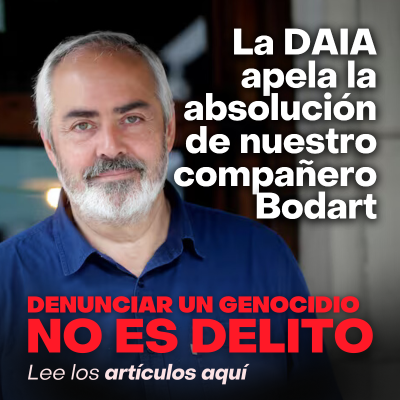Los días 12 y 13 de marzo se realizó en Lahore el congreso nacional de The Struggle, sección de la LIS en Pakistán. Participaron del congreso Alejandro Bodart y Volkan Arslan de la coordinación de la LIS, dirigentes de Argentina y Turquía respectivamente, junto a Cele Fierro de la dirección nacional del MST-FITU de Argentina. Para socializar este importante evento entrevistamos a Imran Kamyana, de la dirección nacional de The Struggle, que nos cuenta sobre el congreso, las Obras Seleccionadas del dirigente histórico de The Struggle Lal Khan, que acaban de publicar, algunos debates históricos importantes del subcontinente, la situación política de Pakistán y la perspectiva que se abre para The Struggle y la LIS en la región.
¿Qué balance hacen del congreso que acaban de realizar?
Los congresos de The Struggle han sido siempre eventos importantes no solo para nuestra organización, sino para toda la izquierda en Pakistán. Particularmente desde 2000, 2001, se han transformado en una referencia y son seguidos no solo en Pakistán, sino también en el mundo. Marxistas revolucionarios de varios países nos mandan saludos de solidaridad y estos congresos también brindan energía, mostrando el potencial de construir partido revolucionario en un país como Pakistán, que a menudo se muestra en los medios como una sociedad religiosa y fundamentalista en la que no se podría construir ningún partido revolucionario ni haber ninguna revolución, ni hablar de socialismo. Entonces, nuestros congresos muestran otro aspecto de la clase obrera y la sociedad de Pakistán. Demuestran que incluso en estas condiciones puede haber lucha de clases y puede haber movimientos revolucionarios y es posible prepararse para esos movimientos y construir el partido revolucionario para intervenir en ellos y hacer una revolución no solo en Pakistán sino en todo el continente.
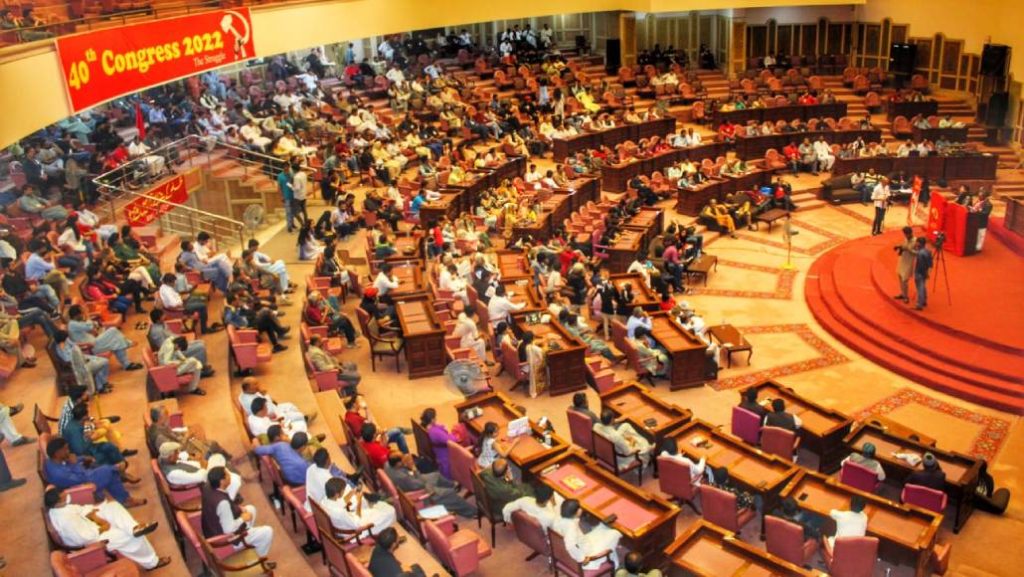
Recientemente se ha hecho muy difícil realizar nuestros congresos, particularmente desde que llegó al poder este gobierno semidictatorial, controlado por las fuerzas armadas. Se nos ha hecho muy difícil conseguir el permiso para realizar nuestro congreso, porque no se puede realizar un evento político de estas dimensiones sin un certificado de «no objeción» de las autoridades de gobierno. Este año, al igual que en el congreso anterior, nos demoramos tres meses en conseguir ese permiso, y hasta una semana y media antes del congreso no sabíamos si lo íbamos a poder realizar.
Ese es un aspecto de las dificultades que tuvimos. La otra es que Pakistán ha entrado en un programa del FMI y hay estanflación en el país, con una inflación de dos dígitos y crecimiento virtualmente nulo. Los precios de todas las necesidades básicas se han por lo menos duplicado en los últimos tres años, la desocupación es alta y a nuestros militantes se les ha dificultado la recaudación para venir al congreso. Porque Pakistán es un país vasto, algunos tienen que viajar dos o tres días en tren o bus para llegar y requiere mucho dinero.
Entonces fue muy difícil para compañeros trabajadores y de los sectores más pobres llegar al congreso. Algunos tuvieron que tomar préstamos o vender pertenencias, y así todavía muchos no pudieron llegar por los problemas financieros, lo cual afecto la concurrencia en alguna medida. Por otro lado, los costos del la sala, de la comida, de todo, ha aumentado. Tuvimos que hacer una campaña financiera muy intensa en todo el mundo para juntar los fondos.
De todos modos, de conjunto fue un congreso exitoso en cuanto a su asistencia, con unos 1500 compañeros participando a lo largo de los dos días. Un dato a resaltar es que aumentó considerablemente la participación de compañeras en este congreso. Ellas merecen un gran reconocimiento porque en países como Pakistán, las condiciones de doble opresión y doble explotación de las mujeres son realmente miserables y es un gran logro para nosotros que más mujeres se estén incorporando a la organización.
Políticamente, fue un congreso muy energético, todos estuvieron muy entusiasmados, las discusiones fueron de muy alto nivel. Los compañeros de la LIS abrieron el punto sobre la perspectiva mundial, luego discutimos la perspectiva de Pakistán, luego hubo una presentación de las obras seleccionadas del compañero Lal Khan, que acabamos de publicar, y luego el punto de organización. Fueron dos días llenos de cantos, consignas y ovaciones que brindó un nuevo aire a nuestra organización, como cada congreso.
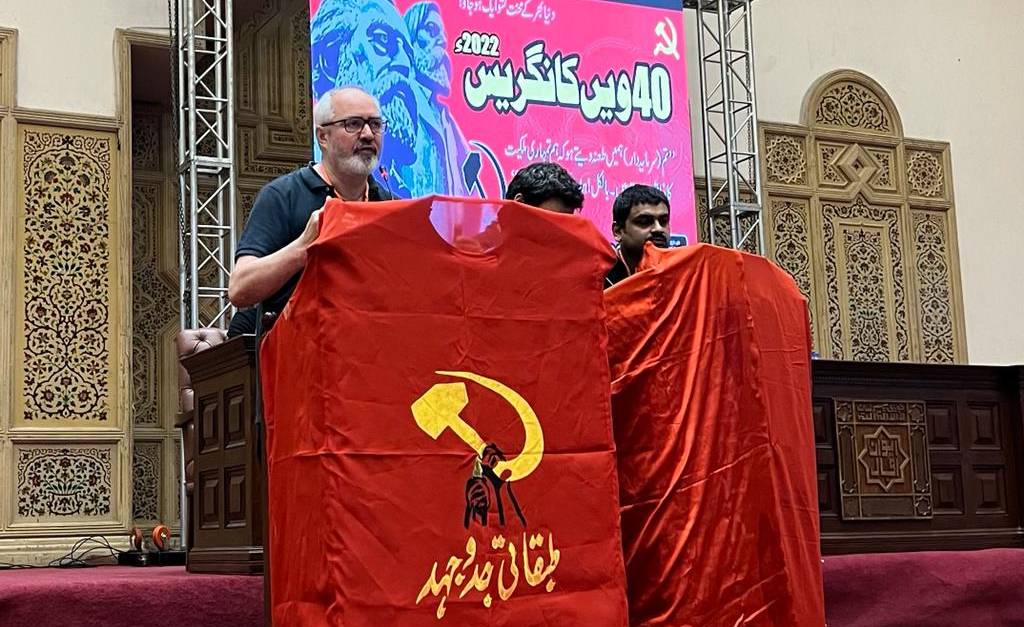
Publicamos dos documentos para el congreso. Uno fue el de perspectiva mundial y de Pakistán, que fue elaborado en colaboración con los compañeros de la LIS, y el otro sobre la construcción de la organización. En síntesis, fue un congreso muy exitoso, ya que el año pasado no pudimos hacerlo por la pandemia, y era crítico poder realizar este congreso. Esto dará mucho entusiasmo, energía y coraje a nuestros compañeros en Pakistán y en todo el mundo. Es un nuevo hito en el camino de construir un partido revolucionario en Pakistán y Asia del Sur.
Acaban de publicar las Obras Seleccionadas de Lal Khan. Uno de sus aportes importantes fue el análisis que hizo de la partición de India. ¿Nos contas?
Las Obras Seleccionadas de Lal Khan que acabamos de publicar consiste en tres grandes volúmenes, unas 2500 páginas en total. Contiene los artículos de Lal Khan que escribió principalmente en medios burgueses entre 2011 y 2020, y otros que escribió en nuestro periódico. La mayoría tienen una extensión de 1300 palabras, que era el límite del diario en el que escribía. Muchas son traducidas del inglés, porque también escribió mucho para el principal diario en inglés de Pakistán.
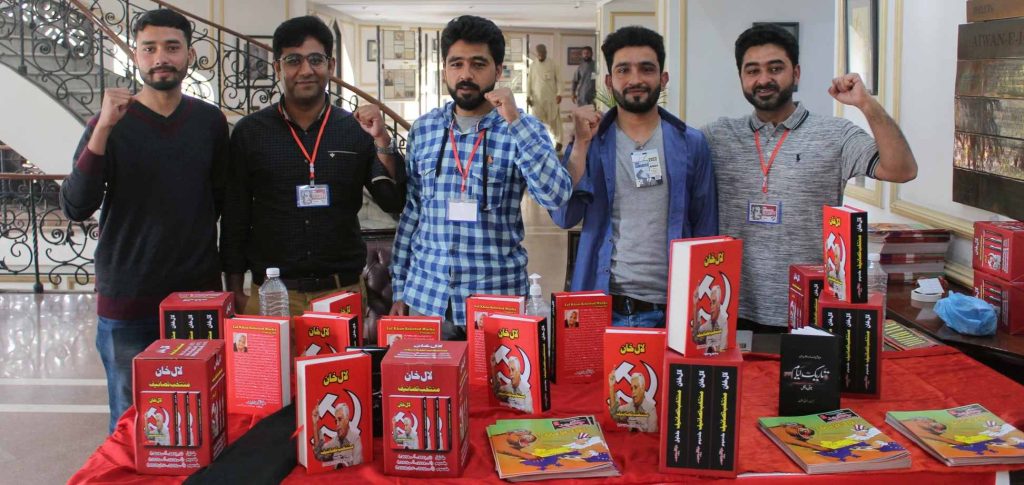
Es una publicación muy importante porque es el Lal Khan maduro, de los últimos años de su vida. Contiene las posiciones ideológicas maduras que adoptó sobre prácticamente cada tema que un revolucionario se pueda enfrentar en su vida sobre la sociedad, la cultura, la economía, el imperialismo, el fundamentalismo, la naturaleza peculiar de sociedades como la de Pakistán, dado su desarrollo desigual y combinado. También sobre los asuntos internacionales que transcurrieron durante esos años, las guerras, la diplomacia, también los aspectos psicológicos de la sociedad. Muchos de estos artículos son muy poéticos, escritos en forma muy artística, así como escribía Trotsky algunos de sus escritos sobre la cultura, la psicología humana y los asuntos sociales.
La obra será una especia de libro de estudio, no solo para nuestra organización, sino también para otras corrientes y tendencias que buscan construir un partido revolucionario en países como Pakistán. Intentaremos traducir su introducción para los compañeros internacionalmente.
Uno de los temas históricos muy importantes que aparece una y otra vez en los escritos de Lal Khan es la partición del subcontinente indio en los Estados de India y Pakistán, y luego Bangladesh, que se separó de Pakistán más adelante.
Lal Khan siempre le dio mucha importancia a este incidente que cambió el curso de la historia de toda la región. Básicamente se desmembró a esta civilización de 7000 años sobre líneas religiosas, en dos países. Y esta sociedad no se ha logrado recuperar de esa herida perpetrada por el imperialismo británico. Los fundamentalismos, tanto el hindú como el islámico, originaron en su forma moderna de la partición. 2,7 millones de personas perecieron en las masacres que se perpetraron entre sijes, hindúes y musulmanes durante la partición. Este trauma sigue presente en la psicología de los pueblos de esta parte del mundo hasta hoy.
El libro de Lal Khan Crisis en el subcontinente: ¿La partición se puede deshacer? explica todo el proceso de la independencia india, de la revolución de 1956 que echó a los británicos de esta parte del mundo, y los llevó a dividir a India y crear un Estado teocrático para amortiguar entre India y la Unión Soviética. También para dividir a la clase obrera sobre líneas religiosas e impedir la posibilidad de una revolución continental que pudiera estallar no solo contra el imperialismo, sino contra todo el sistema capitalista. Lal Khan explica detalladamente este crimen histórico del imperialismo y también las profundas implicaciones que tiene a la hora de comprender la realidad social, política y económica actual del subcontinente. Le hemos regalado un copia del libro a los compañeros de la LIS y sería bueno poder traducirlo a otros idiomas para que todos los compañeros de la internacional lo puedan leer y conocer.
Nuestra corriente fue la primera que desarrolló un análisis marxista de la partición y planteó una solución socialista a la división impuesta por el imperialismo. Levantamos la consigna de una federación voluntaria de repúblicas socialistas de todos los pueblos del subcontinente, y podríamos incluir a Bután, Nepal, Sri Lanka, Afganistán, Myanmar, incluso Irán.
Es una salida hacia una reunificación de esta región sobre una base superior, socialista, sobre la cual la candente cuestión nacional de la región puede resolverse, incluyendo el conflicto de Cachemira, el de Baluchistán y tantos otros. Los movimientos separatistas que abundan en la región demuestran que el capitalismo en crisis no pudo crear una nación estado unificada con las diversas nacionalidades presentes en esta parte del mundo.
Junto con el llamado a la federación socialista, hacemos el llamado a eliminar estas fronteras artificiales dibujadas en el mapa por los imperialistas. Las tres fronteras de Pakistán fueron impuestas por tratados imperialistas: la Línea Durand de 1843 que divide con Afganistán, la Línea McMahon de 1914 que divide con China, y la Línea Radcliffe de 1957 que divide con India.
La única esperanza de paz, desarrollo y estabilidad en esta región y la única esperanza de eliminar las guerras y las tensiones entre estos estados, es una revolución socialista en toda la región. Sobre una base socialista, se podrá ejercer el derecho a la autodeterminación de todas las nacionalidades, y sobre la base de la solidaridad de clase, e podrá unir la región en una federación socialista en la cual la opresión nacional pueda deshacerse y los abundantes recursos del subcontinente puedan ser utilizados, no para el beneficio de unos pocos sino para las necesidades de los 1.500 millones de personas que viven en pobreza en Asia del sur.
¿Cuál es la perspectiva política de Pakistán?
No hay perspectiva alguna de estabilidad social, política y económica en Pakistán. El país ha recurrido al FMI varias veces en las últimas décadas y ahora está nuevamente bajo un plan del FMI. Se están implementando duras medidas de austeridad y devaluación y las condiciones de vida de la mayoría del pueblo están empeorando. También hay conflictos dentro del Estado. Un sector quiere sacar a este gobierno títere encabezado por Imran Khan, mientras otro sector lo quiere sostener.
En estos días, la oposición presentará una moción de censura contra el primer ministro en la Asamblea Nacional. El gobierno dice que convocará una gran movilización frente a la Asamblea Nacional el día de la moción de censura y la oposición amenaza con convocar una contra movilización. Puede haber enfrentamientos y revueltas en estos días.
Todo el gobierno de Imran Khan ha sido un desastre. Muestra el fracaso del reformismo. Llegó con una agenda populista de derecha, contra la corrupción, por una supuesta soberanía nacional. Pero hizo todo lo contrario a lo que prometió y ha perdido mucho apoyo. Por otro lado, la oposición no ha sido capaz de presentar ninguna alternativa al capitalismo ni al FMI. Entonces la mayoría del pueblo es indiferente ante la política de la clase dominante, porque ninguna facción de la clase dominante presenta una solución a sus problemas sociales y económicos.
En este sentido hay un reflujo relativo en el movimiento obrero en Pakistán. Ha habido algunas luchas aisladas, fundamentalmente de los trabajadores estatales, que han conformado una serie de frentes únicos de sindicatos y federaciones para luchar por aumentos salariales y para frenar privatizaciones. Por ejemplo, los ferroviarios lograron postergar privatizaciones y un aumento salarial del 25%. Pero no hay un movimiento a nivel nacional actualmente.
Sin embargo, a la mayoría del pueblo se le está haciendo más difícil llegar a fin de mes y hay posibilidades de un estallido en el próximo período, particularmente en la medida que la crisis de la economía capitalista paquistaní se profundiza.
El centro de la cuestión es que las clases dominantes de Pakistán son incapaces de desarrollar el capitalismo sobre bases saludables. Es evidente de la experiencia de las últimas seis o siete décadas que no fueron capaces de completar ninguna de las tareas de la revolución democrática burguesa en el país, ni una sana democracia parlamentaria, ni un Estado laico, ni la reforma agraria, ni la industrialización. Todavía son las fuerzas armadas las que tienen la última palabra en la política, en la diplomacia y en cada aspecto de la sociedad.
Por otro lado, la crisis política se profundiza, y las medidas implementadas por el FMI no han resuelto las contradicciones fundamentales del capitalismo paquistaní. Entonces la perspectiva en el próximo período es de inestabilidad, caos, división dentro de la clase dominante y la posibilidad de estallidos sociales y movimientos de la clase trabajadora. Tanto los revolucionarios como los analistas sociales podemos ser sorprendidos porque nadie sabe cuando toda la frustración y bronca puede estallar en rebelión y revolución. Lo que está claro es que la sociedad paquistaní está embarazada de una revolución en la cual los marxistas paquistaníes tendremos que jugar un papel fundamental para dirigirla al socialismo.
¿Nos cuentas de la campaña que están realizando contra el FMI?
Estamos impulsando una campaña nacional contra el FMI a través de nuestro frente sindical, el PTUDC (Campaña de Defensa Sindical de Pakistán). Hemos levantado las consignas contra el FMI en las luchas por demandas inmediatas del movimiento obrero.

Explicamos a los trabajadores que el FMI es parte integral de este paquete capitalista, que mientras haya capitalismo en Paquistán va a haber FMI, y mientras haya FMI habrán aumentos de precios, inflación, desocupación, recortes, ajuste, privatizaciones. En cada actividad de la juventud, los estudiantes o trabajadores, levantamos las consignas contra el FMI, porque es un tema candente en Pakistán y hay mucha bronca contra las políticas del FMI en el pueblo.
Pero ninguno de los partidos dominantes ofrece un programa alternativo a las políticas del FMI. Ninguno plantea la posibilidad de salir del acuerdo con el FMI, ni siquiera el Partido Popular, el partido supuestamente progresivo o de izquierda.
Entonces es nuestro deber, junto a otras organizaciones progresivas, impulsar un programa contra el FMI y exigir un fin inmediato de todo vínculo con el FMI y luego explicar a las masas cómo podemos manejar el país y desarrollar la economía y la sociedad y progresar sin ir al FMI o al Banco Mundial. En este sentido, explicamos todo nuestro programa de transición de nacionalización y planificación económica. Así tornamos la lucha contra el FMI en una lucha contra todo el sistema capitalista.
¿Cómo surgió The Struggle?
The Struggle lleva el nombre del periódico que en realidad se llama “The Class Struggle” (La Lucha de Clases) que fue fundado en 1980 por los camaradas en el exilio, porque tuvieron que huir de Pakistán durante la dictadura reaccionaria y brutal de Zia-ul-Haq, o de lo contrario podrían haber sido asesinados. Ellos fundaron esta organización, en ese entonces como una tendencia socialista dentro del Partido Popular de Pakistán (PPP), que era muy de izquierda en ese momento en comparación con lo que es hoy. Eran partidarios socialistas/marxistas del Partido Popular y querían construir una tendencia marxista dentro del partido para un derrocamiento revolucionario no solo del régimen de Zia sino de todo el sistema capitalista.
Luego entraron en contacto con los compañeros del CIT, Comité por una Internacional de los Trabajadores, encabezado por Ted Grant, y se afiliaron al CIT, que entonces tenía una gran organización en Inglaterra conocida como The Militant. Fuimos parte de esa internacional durante mucho tiempo, y mejoramos y pulimos esta política de intervención dentro del PPP para construir el partido revolucionario en Pakistán. Este entrismo lo llevamos adelante en el PPP durante muchas décadas, y es todo un debate qué es el entrismo y cómo lo llevamos adelante. Pero mientras tanto usamos ese entrismo para construir y desarrollar nuestra propia organización revolucionaria que es básicamente The Struggle.
Hubo algunas rupturas, alguna crisis, durante todos esos años, pero seguimos creciendo, particularmente después del 2000. Y fue un período muy difícil, después del colapso de la Unión Soviética, pero con el trabajo duro de compañeros como Lal Khan y otros tantos seguimos con la construcción del partido revolucionario.
Introdujimos el trotskismo en Pakistán por primera vez a escala relativamente grande y construimos un partido trotskista. Hasta entonces el Trotskismo se había limitado principalmente a la intelectualidad o a algunos círculos elitistas muy limitados. Explicamos los problemas del estalinismo después de la crisis de la Unión Soviética y presentamos un verdadero programa revolucionario basado en la teoría de la revolución permanente. Analizamos la sociedad paquistaní muy profundamente desde la perspectiva del «desarrollo desigual y combinado». Así que usamos estas herramientas desarrolladas por Trotsky para analizar la sociedad pakistaní y construir la herramienta para la transformación de la sociedad.
Recientemente hemos cambiado nuestras tácticas de acuerdo con las condiciones de desarrollo y ahora nos estamos orientando más hacia la construcción de nuestros propios frentes de masas.
Hace unos años nos separamos de la CMI * debido a su total degeneración y sectarismo y el comportamiento burocrático de la dirección, particularmente después de la muerte de Ted Grant en 2008. Hubo un continuo declive ideológico y político de la CMI, con una ruptura casi todos los años. Nosotros rompimos en ese proceso, pero éramos mayoría. Así sostuvimos nuestra organización, consolidamos nuestras fuerzas y seguimos adelante.
Hace unos años entramos en contacto con los compañeros de la LIS y luego de un proceso de discusión, intercambio de ideas y reuniones, decidimos unirnos a la LIS. Creemos que en esta organización internacional podemos aprender de los errores y las razones de la crisis de las internacionales trotskistas y desarrollar una sana cultura de diferencia de opiniones, intercambio de ideas, solidaridad y compañerismo. Con esta determinación y coraje construiremos un partido revolucionario no solo en Pakistán, sino también en India, Afganistán, Irán, China y en todo el mundo.
¿Cómo ves el desarrollo y la perspectiva de la LIS?
Fue un gran honor que varios compañeros de la LIS viajaron miles de kilómetros para venir a nuestro congreso. Esto fue una fuente de felicidad y entusiasmo muy importante para todos los compañeros presentes en el congreso y también para los que no pudieron asistir. Fue muy importante su participación, porque juegan un rol importante en la lucha de clases de Argentina, Turquía y otras partes del mundo.
La primera sesión del congreso sobre la perspectiva mundial fue abierta por Alejandro. Fue increíble como los compañeros en la sala prestaron tanta atención a todo su informe, a pesar de ser muy largo porque tenía que haber doble traducción al inglés y luego al urdú. Y sin embargo nadie salió de la sala, no había murmullo, los compañeros prestaron mucha atención al informe así como a las intervenciones de Cele y de Volkan.
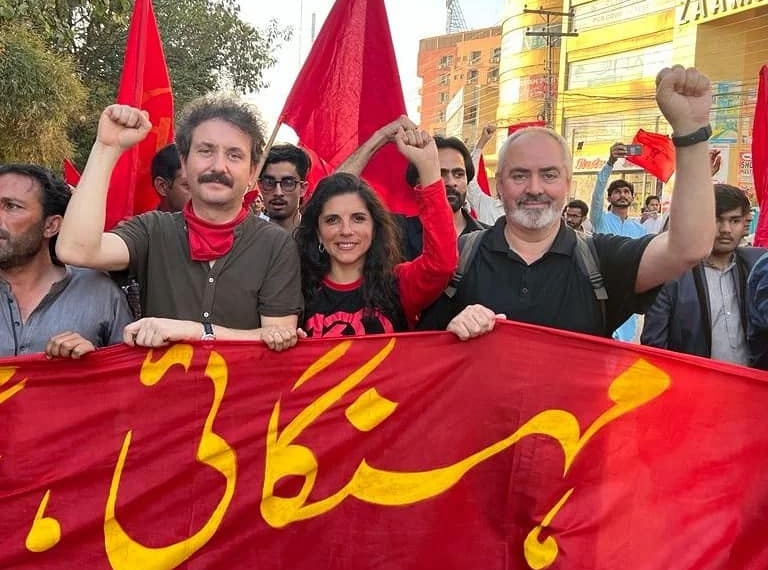
En nuestro documento mundial para el congreso, básicamente tradujimos el documento mundial elaborado por la LIS al urdú. Fue muy apreciado por la dirección y por la militancia. Está muy bien escrito, es muy integral y agudo. Entonces nos gustó mucho y nos ayudó mucho a desarrollar el punto internacional. En este sentido, el congreso de la LIS aportó mucho a nuestro congreso nacional. Aunque tenemos algunos matices, se pueden discutir y no son sustanciales.
En el futuro inmediato, creemos que la LIS tiene un rol grande e importante que jugar en los movimientos que estallarán por todo el mundo. Y tiene que jugar el rol vital de construir un partido revolucionario internacional basado en las verdaderas tradiciones del bolchevismo y el leninismo.
En este sentido, creemos que hay mucho espacio para la discusión en la LIS, hay mucha capacidad para aprender y enseñarnos mutuamente. Y hay un gran potencial para las campañas de solidaridad y las acciones unificadas y consecuentes a escala mundial, en el camino colectivo de la construcción del partido revolucionario a escala internacional.
Estamos muy contentos y satisfechos de ser parte de la LIS y haremos todo lo posible para desarrollar y construirla. Nuestro mensaje a todos los compañeros de la LIS es que marchemos juntos para acabar con este sistema en todo el mundo de una vez por todas.
* En 1992 la CIT se dividió y el dirigente histórico de la corriente Ted Grant fundó junto a Alan Wood La Corriente Marxista Internacional (CMI).





